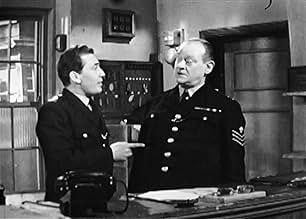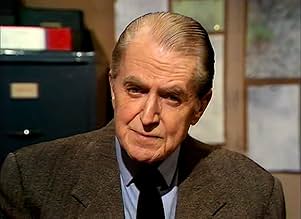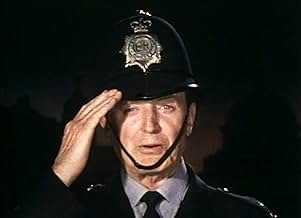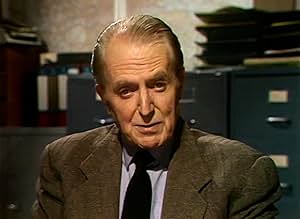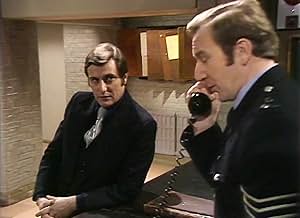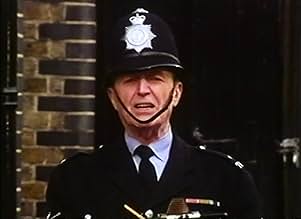Füge eine Handlung in deiner Sprache hinzuConstable George Dixon and his colleagues at the Dock Green police station in the East End of London deal with petty crime, successfully controlling it through common sense and human underst... Alles lesenConstable George Dixon and his colleagues at the Dock Green police station in the East End of London deal with petty crime, successfully controlling it through common sense and human understanding.Constable George Dixon and his colleagues at the Dock Green police station in the East End of London deal with petty crime, successfully controlling it through common sense and human understanding.
Folgen durchsuchen
Empfohlene Bewertungen
I'm afraid we all took this TV cop series for granted when it was on you don't know what you've got till it's gone. 432 episodes were broadcast 1955-1976, over 400 of them junked by the BBC all the way up to 1975 and not many illegally filmed by any of the TV viewers at the time either. It was PC George Dixon's, sorry, Jack Warner's show, it suited his avuncular personality down to the ground. In his case familiarity bred warmth. His weekly homily could range from you to be on your guard for scams to children to know their kerb drill, and other such laudable aims. When he started to get too old to pound the beat and others took up the stories instead it started to lose that special feeling the real world began to creep in. Saturday evenings were never the same again. When he stopped pounding the beat I think every copper in Britain must have done so too, and hardly any have been seen since.
The Roaring Boy broadcast 18.08.56: The programme was played live as was everything then and is one of a small group from the same period that managed to avoid being binned afterwards. Dixon has to check on whether army deserter skinny Kenneth Cope has been sighted in the neighbourhood, by going to see his girlfriend. He finds him and we're in for a tense psychological 15 minutes as psychological as Dixon was ever likely to get anyway. The story was bookended with an old lady gossipping to the station Sergeant which was reminiscent of Mrs. Lopsided in The Ladykillers which Warner had recently been in, even managing to be a Superintendent there. Peter Byrne who played Detective Andy for all those years made a brief appearance shortly before his marriage to Dixon's daughter Mary.
Unsensational and unrealistic as it may have been, 40 years ago it was as realistic as I wanted anything to get and want to get now. I don't need to graphically see how bad the baddies are because I don't consider myself to be one. And of course, were cops ever part of their communities as depicted at Dock Green? But great to see again to check how much our lovely society has progressed since then.
The Roaring Boy broadcast 18.08.56: The programme was played live as was everything then and is one of a small group from the same period that managed to avoid being binned afterwards. Dixon has to check on whether army deserter skinny Kenneth Cope has been sighted in the neighbourhood, by going to see his girlfriend. He finds him and we're in for a tense psychological 15 minutes as psychological as Dixon was ever likely to get anyway. The story was bookended with an old lady gossipping to the station Sergeant which was reminiscent of Mrs. Lopsided in The Ladykillers which Warner had recently been in, even managing to be a Superintendent there. Peter Byrne who played Detective Andy for all those years made a brief appearance shortly before his marriage to Dixon's daughter Mary.
Unsensational and unrealistic as it may have been, 40 years ago it was as realistic as I wanted anything to get and want to get now. I don't need to graphically see how bad the baddies are because I don't consider myself to be one. And of course, were cops ever part of their communities as depicted at Dock Green? But great to see again to check how much our lovely society has progressed since then.
A middle aged Jack Warner began playing the role of his life, that of Police Constable (PC) George Dixon, in the 1950 Ealing film THE BLUE LAMP, sadly perishing in that film at the hands of a very nasty and young Dirk Bogarde.
Beginning in 1955, DIXON OF DOCK GREEN went on TV air for 432 episodes until its demise in 1976. Naturally, Warner aged with the series but never lost his good humor, warmth, and his portrayal of a copper with a family who treats the public as extended family, always within the bounds of respect and the law, implementing his impeccable approach with stickler-like care. As another viewer remarked, no bad or even remotely thoughtless language ever departed the lips of any of the staff at Dock Green police station, and least of all PC Dixon.
I am not British and did not live in the UK in the heyday of this series... but it still says a lot to me. 8/10.
Beginning in 1955, DIXON OF DOCK GREEN went on TV air for 432 episodes until its demise in 1976. Naturally, Warner aged with the series but never lost his good humor, warmth, and his portrayal of a copper with a family who treats the public as extended family, always within the bounds of respect and the law, implementing his impeccable approach with stickler-like care. As another viewer remarked, no bad or even remotely thoughtless language ever departed the lips of any of the staff at Dock Green police station, and least of all PC Dixon.
I am not British and did not live in the UK in the heyday of this series... but it still says a lot to me. 8/10.
This was British TV's original police series. I'm not old enough to remember the early days of this show, but I grew up with it in the sixties and seventies. At the time, Dixon of Dock Green already seemed old fashioned compared with Z-cars or US shows like Ironside. It was a cozy and faintly sentimental representation of policing. Despite this, it retained a certain authenticity that other shows lacked. The police officers that I had met had more in common with Dixon than any other TV character. Jack Warner's perennial character George Dixon oozed calm authority and respectable self-assurance. Each programme was introduced by the whistled theme tune after which George Dixon would always begin a spoken introduction direct to camera with the words "Evening all". He would make dry observations about "villains" and the frailties of human nature. The episode's drama would then be played out. By the seventies Dixon himself rarely played a huge part in the story; he was pretty old. The programme would end with Dixon again; this time proposing a moral for the story. He invariably signed off with the words "'Night all". They don't make shows like this any more. Pity.
PC George Dixon died just 21 minutes into the film _The Blue Lamp (1950)_ (qv). When filler was needed after a season of _"Fabian of the Yard" (1954)_ (qv) ended 'Ted Willis' (qv) wrote six scripts with PC Dixon back in Dock Green. The series was steady, authentic, and even down to checking that: a) The helmet is kept on when entering a house, but b) is, out of courtesy, when addressing elderly ladies, and c) is removed and held neatly under the right arm when addressing a bishop. [not sure how many bishops where in the programme though] At a time when New York City would see more murders inn a week than Great Britain would in a year it is not surprising that Dock Green was a series of low-level crimes. A gentle series which meant George Dixon's promotion to sergeant in 1964 was a big change , caused in part by 'Jack Warner' (qv)'s arthritis and by his age . (70-year-old coppers don't walk the beat). This allowed the younger characters to come to the fore, although the violent crime rate was never increased just to keep ratings share. Jack's age and arthritis meant his character rarely left the station, and in the final seasons, rarely came from behind his desk. In 1976 the newer, more violent, cop shows won, and Dock Green Station finally closed its doors. Still, 21 minutes to 21 years isn't bad. Evenin' all
I'm a police officer in the United States. Twenty-four years on duty and 56 years old. I was in my early thirties when I started and more aggressive in my demeanor. My wife has always been a fan of British Police programs. Initially I rolled my eyes at the "Bobby" but as I've gotten older, I've come to adopt the tactics of Dixon and others. Yes, they're fictional characters, but they are inspired by real world events. That low key approach works, saves me wear and tear and resolves things peacefully. Sometimes one must be strict, but often a soft shoe approach is better. A few younger officers are even looking towards me now which I never expected. Good show. One can learn a few things from it.
Wusstest du schon
- WissenswertesOnly 33 of the series' 432 episodes survive: 12 from the monochrome era (1955-1968) and 21 from the colour run (1969-1976). The others were wiped by the BBC. Seasons Three, Four, Six, Eight, Ten, Twelve, Sixteen and Nineteen are missing entirely; conversely the final, 22nd season is the only one to survive completely. Off-air recorded soundtracks also exist for Double Jeopardy (1968), The Trojan Horse (1968), Nightmare Hours (1971) and There's Your Story, There's My Story - And There's the Truth (1974), which were recovered in 2015.
- Zitate
[repeated line]
PC George Dixon: Good evening, all.
- Crazy CreditsEarly editions carried the sub-title: "Some Stories of a London Policeman".
- VerbindungenFeatured in A Christmas Night with the Stars: Folge vom 25. Dezember 1962 (1962)
- SoundtracksAn Ordinary Copper
(uncredited)
Composed by Jeff Darnell
Arranged and Performed by Ken Jones and his Orchestra
[Second series theme tune]
Top-Auswahl
Melde dich zum Bewerten an und greife auf die Watchlist für personalisierte Empfehlungen zu.
- How many seasons does Dixon of Dock Green have?Powered by Alexa
Details
- Farbe
- Seitenverhältnis
- 1.33 : 1
Zu dieser Seite beitragen
Bearbeitung vorschlagen oder fehlenden Inhalt hinzufügen

Oberste Lücke
By what name was Dixon of Dock Green (1955) officially released in Canada in English?
Antwort
